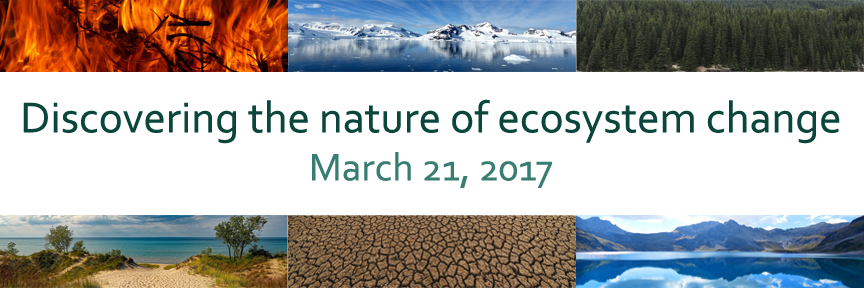Synopsis
Even as sea-level rise, drought, and fire increase pressures on some ecological systems, others are benefitting from protection and restoration efforts. But some changes are not reversible. Long-term research employs observations of past changes, together with long-running experiments and modeling to understand the processes responsible for sustaining ecological functions. Drawing on concrete examples and new ecological theory, five researchers from across the Long-Term Ecological Research (LTER) Network describe science that can help discern which changes may allow for recovery and which are more likely to irreversibly transform ecological systems. Posters describing ongoing LTER research and samples of the LTER children’s book series will be on display throughout the morning. To attend, please RSVP to Cheryl Dybas, NSF Public Affairs (cdybas@nsf.gov), at least 24 hours in advance.
[button link=”http://nco.lternet.edu/agenda/” color=”silver”] View the Full Agenda[/button] [button link=”http://intranet2.lternet.edu/documents/394″ color=”silver”] View the Presentations[/button]
Learn more about the talks:
[accordion] [accordion autoclose=”true” openfirst=”false” openall=”false” clicktoclose=”true”] [accordion-item id=”desertification” title=”Beyond desertification: new models for state change in drylands”] Researchers at the Jornada Basin LTER site and its host the USDA Jornada Experimental Range have developed a new model of desert grassland ecosystem dynamics that is grounded in long-term data and experiments indicating possible trajectories. Speaker: Dr. Brandon Bestelmeyer, USDA-Agricultural Research Service, Jornada Basin LTER
[button link=”http://nco.lternet.edu/beyond-desertification/” color=”silver”] Talk Description[/button] [button link=”http://nco.lternet.edu/dr-brandon-bestelmeyer/” color=”silver”] Dr. Brandon Bestelmeyer[/button][/accordion-item]
[accordion-item id=”carboncycling” title=”Fire and ice: carbon cycling feedbacks to climate in a warming Arctic”] Wildfires—which are becoming more frequent with warmer and drier weather in the Arctic—have the potential to either stabilize or accelerate regional and global warming through carbon feedbacks. Speaker: Dr. Michelle Mack, Northern Arizona University, Bonanza Creek LTER
[button link=”http://nco.lternet.edu/carbon-cycling/” color=”silver”] Talk Description[/button] [button link=”http://nco.lternet.edu/dr-michelle-mack/” color=”silver”] Dr. Michelle Mack[/button][/accordion-item]
[accordion-item id=”resilientcoasts” title=”Climate-Resilient Coasts: How long-term research and restoration informs management”]A long-term, landscape-scale experiment with seagrass at Virginia Coast Reserve LTER is the first of its kind to show the role of restoration in reinstating ecosystem services, particularly ‘blue carbon’ sequestration. Speaker: Dr. Karen McGlathery, University of Virginia, Virginia Coast Reserve LTER
[button link=”http://nco.lternet.edu/climate-resilient-coasts” color=”silver”] Talk Description[/button] [button link=”http://nco.lternet.edu/dr-karen-mcglathery/” color=”silver”] Dr. Karen McGlathery[/button][/accordion-item]
[accordion-item id=”forests” title=”Legacy of acid rain: A tale of two species “]Changes from acid rain have increased the mobility of dissolved organic matter, and possibly altered soil organic matter dynamics, altering the long-term trajectory for forest ecosystems.
Speaker: Dr. Charles Driscoll, Syracuse University, Hubbard Brook LTER
[button link=”http://nco.lternet.edu/de-acidification-northeastern-forests” color=”silver”] Talk Description[/button] [button link=”http://nco.lternet.edu/dr-charles-t-driscoll/ ” color=”silver”] Dr. Charles Driscoll[/button][/accordion-item]
[accordion-item id=”yahara” title=”Plausible freshwater futures: Yahara watershed, Wisconsin, USA”]In Wisconsin’s Yahara Watershed, researchers are combining data and modeling from the Northern Temperate lakes LTER with qualitative scenarios to guide decisions about changing land and water use.
Speaker: Dr. Christopher Kucharik, University of Wisconsin–Madison, Northern Temperate Lakes LTER
[button link=”http://nco.lternet.edu/plausible-freshwater-futures/” color=”silver”] Talk Description[/button] [button link=”http://nco.lternet.edu/dr-christopher-j-kucharik/” color=”silver”] Dr. Christopher Kucharik[/button] [/accordion-item]
[/accordion]
Speakers
[pt_view id=”9b24c2abf4″]








